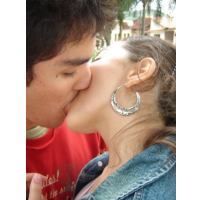80 Million Bacteria Are Transferred in a 10-Second Kiss
 (photo: WIkipedia)
(photo: WIkipedia)
Researchers in Europe have concluded that passionate kisses can involve a lot more than just emotion. They can also include upwards of 80 million bacteria being exchanged between two people.
The findings, published in the journal Microbiome, originated in the Netherlands, where researchers asked 21 couples visiting the Artis Royal Zoo in Amsterdam to have their mouths swabbed.
“To our surprise, we found that those people that are intimately related ... share much more of that bacteria on their tongue than unrelated individuals,” Remco Kort, a microbiologist at the Netherlands Organisation for Applied Scientific Research in Amsterdam and lead author of the study, told National Public Radio.
A single kiss didn’t change the bacteria count significantly, which Kort attributed to the habit couples have of sharing things such as toothpaste and cigarettes. When couples were asked to kiss again after drinking yogurt containing a marker bacteria, researchers were able to pin down how many organisms move from mouth to mouth.
The participants also answered questions about their kissing habits, which revealed men tend to exaggerate how often they kiss, particularly French kiss, their partners. Men said they kissed their partners an average of 10 times a day, while women reported kissing only half as often.
Is all this shared bacteria bad for you? On the contrary, according to Kort. “There’s a number of studies that show that it’s healthy to have a high diversity of microorganisms in your mouth,” he said. So go ahead and pucker up.
-Noel Brinkerhoff, Steve Straehley
To Learn More:
Mouth to Mouth: Kissing Transfers 80 Million Bacteria, Scientists Say (by Karen Kaplan, Los Angeles Times)
What's In His Kiss? 80 Million Bacteria (by Alison Bruzek, National Public Radio)
Shaping the Oral Microbiota through Intimate Kissing (by Remco Kort, Martien Caspers, Astrid van de Graaf, Wim van Egmond, Bart Keijser and Guus Roeselers, Microbiome)
- Top Stories
- Unusual News
- Where is the Money Going?
- Controversies
- U.S. and the World
- Appointments and Resignations
- Latest News
- Musk and Trump Fire Members of Congress
- Trump Calls for Violent Street Demonstrations Against Himself
- Trump Changes Name of Republican Party
- The 2024 Election By the Numbers
- Bashar al-Assad—The Fall of a Rabid AntiSemite






Comments